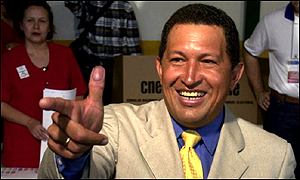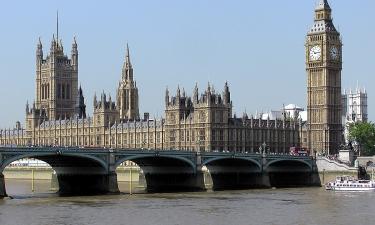Venezuela: Chavez's supporters vow to accelerate shift to 'new Socialism'
The President's allies obtained all 167 seats in the National Assembly in Sunday's vote
Supporters and foes of the Venezuelan leftist President Hugo Chavez, have initiated an angry dispute over the outcome of Sunday's controversial legislative elections. As government's allies prepare to occupy all 167 seats in the National Assembly, opponents believe the vote should be considered invalid, as only 25 percent of the registered citizens went to the polls.
Despite objections, Chavez's supporters believe the government enters into a new time and vowed to accelerate Venezuela's shift to a new socialism. Pedro Lander, a newly electe d congressman, said Monday the new National Assembly will aim to "deepen the revolutionary process more and more."
d congressman, said Monday the new National Assembly will aim to "deepen the revolutionary process more and more."
On the contrary, the opposition believes Chavez has been defeated on Sunday by the low turnout. "Silence united Venezuelans," said Gerardo Blyde of Justice First, one of several leading opposition parties that pulled out days before the vote, complaining the voting system could not be trusted.
Several of Venezuela's major opposition parties boycotted the vote on Sunday, which had an estimated turnout of 25 percent and is likely to further polarize Venezuelan society. Official results were still pending Monday, but internal tallies showed Chavez's party won 114 seats and the remainder went to aligned parties, said Willian Lara, a leader of Chavez's Fifth Republic Movement party.
Some analysts believe elections paved the way to Chavez to amend the constitution and extend term limits for all offices, including the president. Current term limits would bar Chavez from running again in 2012 if he is re-elected next year, but a new law could allow him to keep his post until 2030.
Observers in Caracas commented on Monday that the decission taken by Chavez's opponents to withdraw will left them without representation in the run-up to presidential elections in December 2006. The turnout — lower than in 1998 and 2000 congressional votes — came despite a government effort to get Venezuelans to the polls. "We're not satisfied with the results of the elections," Foreign Minister Ali Rodriguez said Monday.
Chavez has accused the opposition of plotting the boycott with the help of the United States as part of a larger plot to "destabilize" the country. Both Washington and the opposition have denied the accusations.
Sunday's vote left the Venezuelan democratic system without a formal opposition to balance power and offer an alternative to Mr. Chavez, who has now free hands to reform the country's constitution an any institution he considers necessary. As the opposition has no longer institutional representation, it has limited itself to violent methods to oust Chavez from power.
But Chavez also did his best to leave the country without an internal opposition. The President believes all his local foes are being funded by the United States and that they are, at the end of the day, their agents in Venezuelan territory.
Washington has turned into the only anti-Chavez force and only time will demonstrate if the US hawks are eager to fly down south.
Subscribe to Pravda.Ru Telegram channel, Facebook, RSS!





